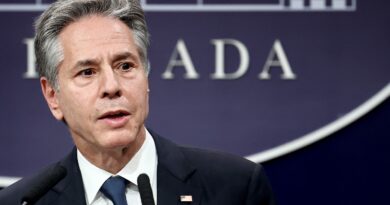British Parliament backs report saying Boris Johnson misled over ‘Partygate’
The vote to accept the report — which strongly suggested that Johnson knowingly lied, but never used that word — was 354-7. As many as 118 Conservative members voted to accept the report.
Though most Conservative Party members abstained, the vote was viewed as a deep humiliation for the formerly highflying politician who once was seen as a vote-getting machine, a populist disrupter who quoted Latin, and a global leader who pulled Britain out of the European Union but was a staunch American ally.
Now? He is a newspaper columnist for a tabloid.
After seeing an early draft of the same report last week, Johnson said he was a victim of a “witch hunt” and promptly resigned his seat.
Misleading Parliament is a serious matter in Britain and can lead to sanctions or a recall election. Essentially, Johnson quit before he could be fired.
Many predicted that Monday’s debate would be a major moment, when the value of truth-telling in Parliament would be upheld. They forecast all sorts of dramatic oratory — Mr. Smith goes to Westminster — but it felt less so.
The green benches in the House of Commons were mostly empty throughout the hours of debate. There was no big moment, certainly no showdown.
For starters, Prime Minister Rishi Sunak was a no-show. Most of Johnson’s fellow Tories — including some of his most ardent supporters — also failed to appear to offer for the record the same impassioned defenses they had earlier made to the media.
During the hours-long debate, the thin scattering of lawmakers could be seen sitting in the benches, scrolling distractedly through their phones.
Even the deputy speaker of the Commons, who oversaw the debate, admonished lawmakers to move on and to stop repeating speeches they had composed days ago.
During the debate, former prime minister Theresa May, squeezed out by Johnson’s allies for not securing a “hard Brexit,” did stand and say that she thought the report was “rigorous” and that she accepted it.
May was not a lone voice from the Conservative Party. A few others from Johnson’s party stood to softly condemn him — as an imperfect man, as a distraction or as a leader who “had a casual relationship with the truth,” as one put it.
Conservative lawmaker Robert Seely, a former Johnson fan, confessed he “was so over Boris.”
Other Tory lawmakers declined to support the report, but their arguments were more about process than evidence. Lawmaker Nick Fletcher said that Johnson was just a human being — and that he “nearly died” during the coronavirus pandemic when he was sent to an ICU.
Others repeated Johnson’s defense: that he didn’t do anything wrong, and if he did, he had relied on his staff.
Condemnation of Johnson, of course, was not lacking from opposition lawmakers, who delivered it in buckets. But that was to be expected.
“There has been no self-reflection, no apology, no acceptance or a shred of responsibility,” said Labour lawmaker Angela Eagle, who called Johnson’s trashing of the report “just the narcissistic howl of a man-child.”
Johnson called the year-long investigation — by a committee with a majority of Conservative lawmakers — a “kangaroo court.”
The former prime minister treated the public “like idiots,” said Ian Blackford of the Scottish National Party, who added, “This is classic Trump.”
Labour’s Dawn Butler said, “The irony is if [Johnson] wasn’t such a weasel and he didn’t resign, he would have been thrown out of this place.”
Butler said, “We knew he was lying, but the system protected him.”
If he had not resigned, the committee would have recommended a 90-day suspension, a remarkable slap-down, which could have led to his recall. If Johnson wants to become prime minister again, he will have to win a new parliamentary seat.
British commentators noted that Monday was Johnson’s birthday. He turned 59. In recent years the former prime minister’s birthday has had an unmistakable edge of political theater.
During his 2020 celebration, on the day he turned 57, Johnson had a cake and a toast with colleagues — an incident that later saw him fined by police for breaking pandemic lockdown rules.
It now appears probable that in accepting the Privileges Committee report, Johnson will lose his parliamentary pass, as it recommends, to come and go at Westminster as he pleases.
This would be humiliating for a politician who in 2019 led his party to an overwhelming victory at the ballot box and who has made no secret of the fact that he’d like his old job as prime minister back. He avoided the more severe sanction of losing his seat in Parliament by preemptively resigning.
Does this spell the end for Johnson?
Maybe not. Johnson has landed a plum new job as a weekly columnist for the conservative Daily Mail tabloid in a nod to his previous career as a journalist.
While writing for the Daily Telegraph, he was often a thorn in the side of the prime minister of the day. In a video announcing his appointment to the Daily Mail, Johnson said that he will be writing “exactly what I think about the world” and that he “may even have to cover politics, from time to time, but I’ll obviously try to do that as little as possible, unless I absolutely have to.”
Johnson is not the only British politician on the hot seat.
A number of Conservative prime ministers — past and present — have also been under pressure.
Sunak’s efforts to move on from the “Partygate” scandal were hampered after the Sunday Mirror newspaper published a video that appeared to show Conservative staffers dancing and joking at a time when indoor socializing was banned. The Metropolitan Police said they would review the video.
David Cameron, the British prime minister from 2010 to 2016, was summoned for another inquiry into the handling of covid-19. Britain recorded one of the world’s highest death tolls in the pandemic, and Cameron was grilled on pandemic preparations.
Under Johnson, his short-lived successor Liz Truss and Sunak, the Conservative governments have been weighed down by scandals. The ruling party is trailing the opposition Labour Party badly in the polls, but the government doesn’t need to hold an election before January 2025.




